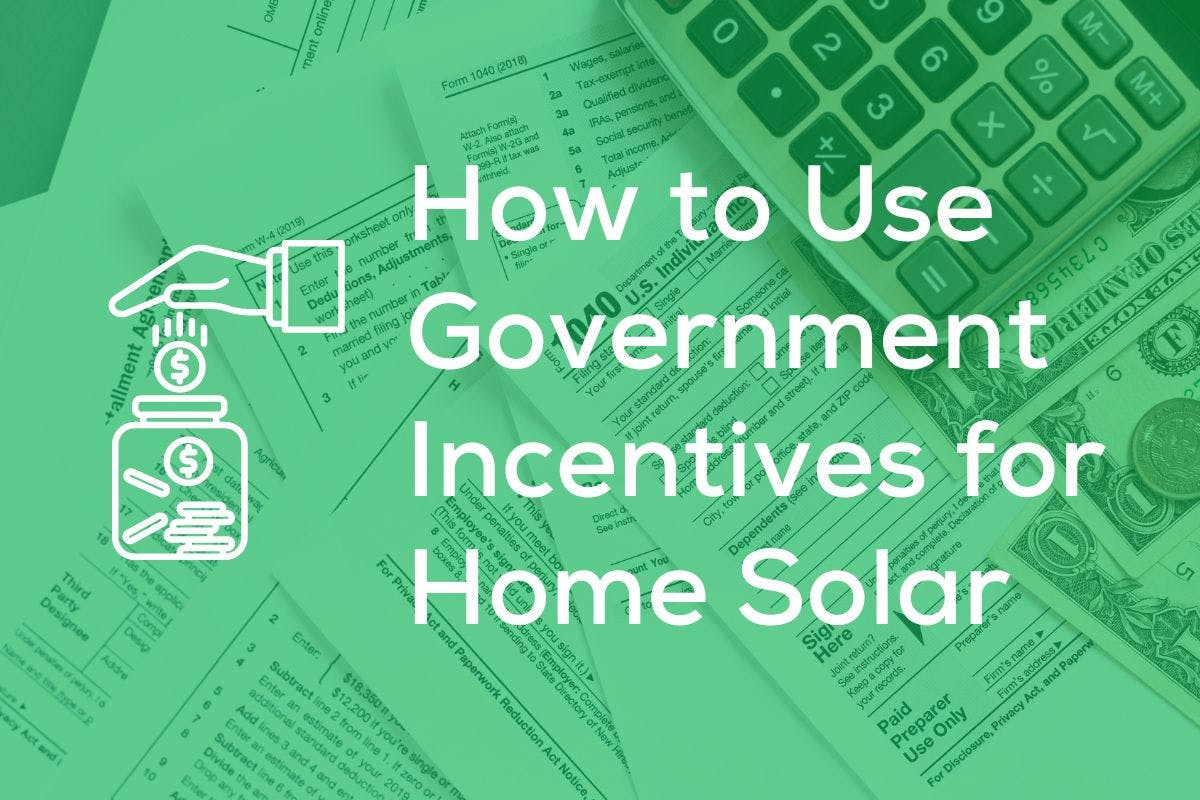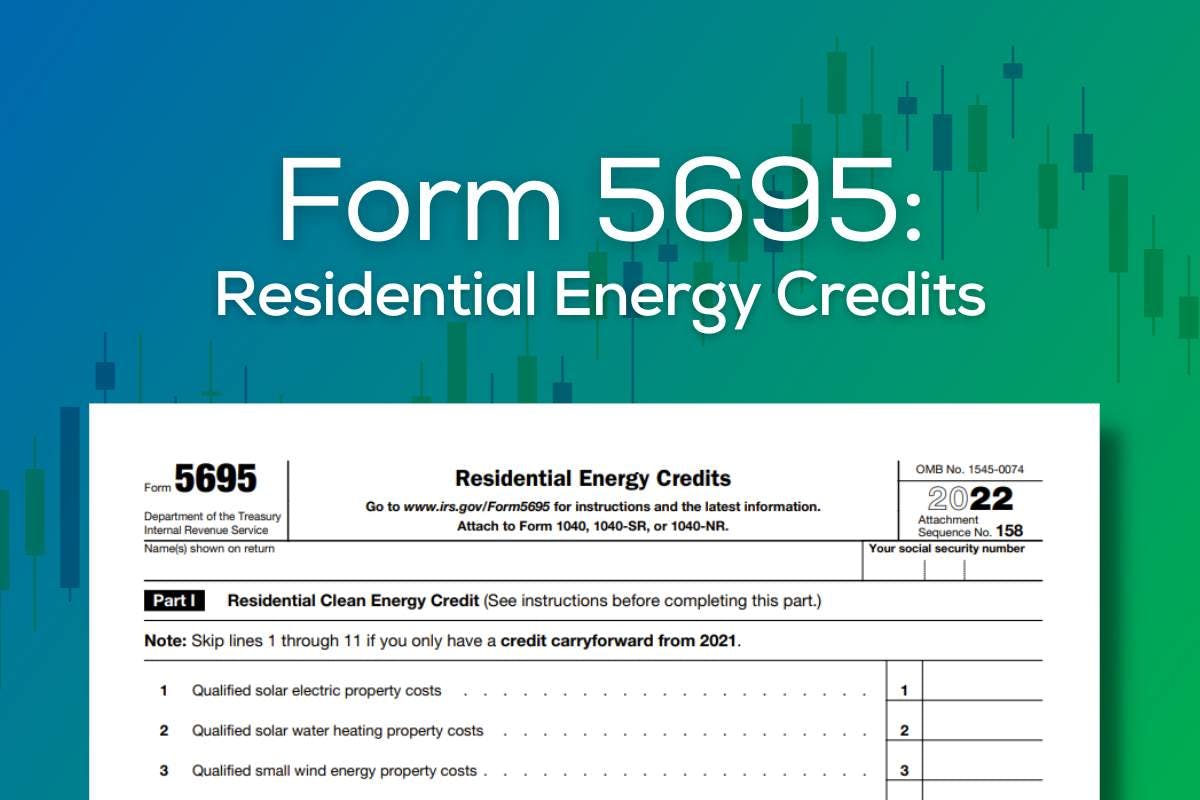Government incentives for solar energy, like tax credits, rebates, and net metering, have helped homeowners all over the United States reduce utility power bills and greenhouse gas emissions in one easy installation.
In this guide, we break down everything you need to know about government incentives for solar energy, including what may be available in your neck of the woods, whether you could qualify, and how to leverage local programs to maximize your savings.
See how much you can save by going solar with Palmetto
Government Incentives for Solar Energy in the US
The number of home solar panels installed in the US has been steadily increasing since around 2010, according to the Solar Energy Industries Association.

Credit: SEIA
This growth is largely thanks to government incentives, technological improvements, and a maturing marketplace that enables homeowners to access affordable solar energy system installations.
Of course, there is always change with growth, and government incentives are constantly appearing, disappearing, and transforming. With this in mind, no matter where you live or when you read this, here are a few steps you can take to explore and maximize government solar incentives for your green energy upgrade.
- Identify which incentives are available for your solar installation
- Determine whether or not you qualify for the programs or benefits
- Work with a professional to streamline processes and maximize your energy savings
Identifying Government Incentives for Solar Energy
Government incentives for solar energy are available at three key levels: national, state, and local. Besides government-sponsored programs, financial incentives for going solar are also commonly available through local electric utility companies.
National: The Federal Solar Tax Credit
First and foremost, the US government offers homeowners a federal solar tax credit, officially known as the residential clean energy credit (RCEC). Available from sea to shining sea, this tax credit can only be redeemed by those who own their solar energy system and live at the residence where it is installed for at least part of the year.
The RCEC can be redeemed as a tax credit against federal income taxes, equal to 30% of solar energy system project costs against federal income taxes otherwise owed. In other words, this credit is not a cash rebate but can help offset personal income tax liability.
So even though there will not be a check in the mail, the federal solar tax credit can significantly drive down the total investment costs of your installation. Since its introduction in 2006, the federal solar tax credit has aided countless homeowners in going solar with savings on solar panels and energy storage systems.
After an extension from the Inflation Reduction Act of 2022, the RCEC is currently available at 30% of system cost through 2032. Then, the value is set to gradually decline starting in 2033 and 2034 before ultimately expiring in 2035 unless otherwise reformed or extended. If your credit is larger than your tax liability for one year, you can claim it in portions over multiple years.
Consult your own tax advisor and resources from the IRS to see how the RCEC applies to your situation.
State: State Tax Credits
Just as the federal government offers a personal income tax credit for those who purchase solar energy systems, several state governments have followed suit.
State tax credit programs for solar are somewhat scarce. Where available, total credit limits vary and are also typically based on the total costs of your installation.
For example, if you were going solar in Arizona, you may be eligible for a state income tax credit worth 25% of installation costs up to a maximum value of $1,000. This credit could then be applied to your state income tax liability separately but in the same year as the federal RCEC.
State: Property Tax Exemptions
In 2024, 36 states have policies that exempt the value of a solar energy system from property tax assessments. These policies prevent your property taxes from rising as a result of going solar so as not to penalize you for a smart renewable energy upgrade.
On the other hand, if you purchase solar panels and decide to sell your home, the value of your renewable energy system may increase its market price.
State: Sales Tax Exemptions
Like with property taxes, solar energy systems are also exempt from sales taxes in about half of the United States. Sales tax exemptions take slightly different forms state-by-state and may not always apply to every aspect of a solar installation.
State: Net Metering and Renewable Energy Certificates
Governed primarily at the state level, net metering, net billing, and renewable energy certificate programs vary greatly depending on where you live in the US.
These policies fall under the umbrellas of “feed-in tariffs” or “solar generation incentives,” involving how local utilities compensate solar energy system owners for the electricity they produce and share with the grid.

Credit: DSIRE via SEIA
So although net metering policies may not be considered a literal government incentive for solar energy, they are a very important part of the financial calculation for homeowners adopting solar panels. Net metering policies are mandatory in some states and can incentivize home installations by making them more valuable.
In short, the rates at which your utility credits you for the solar power you generate will always depend on government policy. In most states, these net metering or net billing regulations are controlled by public utility commissions.
Learn more: How To Save On Electric Bills With Solar Panels
See how much you can save by going solar with Palmetto
Local: Green Energy Rebates and More
After exploring federal and state government incentives for solar energy, it’s time to go local.
How local? Well, as local as you can get.
Towns, cities, and counties across the US are rewarding residents for offsetting greenhouse gas emissions with local clean electricity generation. Often, this will come in the form of a one-time rebate at a value based on the size of the solar panel system.
For example, the City of Fort Collins, Colorado, offers residential rebates worth up to $1,500 for solar panel installations or up to $3,000 for systems that include solar battery storage.
To find the solar energy policies, incentives, and rebates available in your area, we recommend using the Database of State Incentives for Renewables & Efficiency (DSIRE) from the North Carolina State University Clean Energy Technology Center. (Confirm these policies are active and apply to you before moving ahead with your project.) Or, you can choose to visit your local resources directly, including city and state government websites.
Determine if You or Your Solar Energy System Qualifies
So, as you can see, solar energy incentives are often geographically specific; where you live will largely determine your fate. Knowing this, the next time you read something promising unbeatable incentives, verify that they are both legitimate and available for your specific property.
Beyond location, location, and location, a few other personal circumstances could impact your qualification for government-sponsored solar incentives.
- Equipment: Residential solar incentives are usually for permanent installations that power your home. Whereas single-use solar devices can electrify exterior lights or charge your phone on the go, these small-scale products will rarely qualify for substantial government incentives.
- System design: How your solar energy system operates with the grid will determine which government incentives you can leverage. For example, some rebates are exclusively available for grid-tied solar panels and cannot be redeemed for off-grid solar energy systems.
- Purchasing decisions: You may not qualify directly for specific governmental solar incentives (like the federal tax credit) if you do not own your energy system. With that said, if you decide to lease solar panels or opt for a power purchase agreement (PPA), your provider may be able to reduce your total contract expenses by passing along savings from commercial solar incentives. Palmetto’s LightReach Energy Plan lets you get rooftop solar panels without the upfront cost. LightReach Plans deliver savings in their first year.
- Opportunity to save: Lastly, several solar incentives may only be valuable to those with other expenses that need to be offset. For instance, the federal solar tax credit can only reduce your personal income tax if you have a tax liability in the first place.
Fill Out the Paperwork and Start Saving
Finally, with the help of a professional or two, you can apply for government incentives for solar energy with the appropriate paperwork and procedures. Usually, incentives can only be redeemed after an installation has been completed, so it is important to determine the programs for which you will qualify before signing your solar contract.
Every government incentive for solar energy has its own unique redemption process. While personal tax credits will most likely be claimed when you do your annual filing (with Form 5695 for the RCEC), other rebates and incentives will have their own separate documentation and requirements.
When you go solar with Palmetto, we take the guesswork out of paperwork with expert assistance at every step of the solar process. To see how much you can save on your ongoing energy costs with home solar in seconds, try the Palmetto home solar calculator.
The Financial Impact of Government Incentives for Home Solar
To illustrate the impact of government incentives, let’s walk through the immediate and long-term savings you could earn on your solar panel installation with multiple incentives from federal and local government programs.
Let’s say you:
- Live in Illinois and own your home
- Want to install a 9 kW solar energy system
- And have a total project cost of $28,000
As a homeowner and taxpayer, you may be eligible for the residential clean energy credit. At 30% of total project costs, this could translate into a federal income tax credit worth $8,400.
Getting a bit more local, if you are a ComEd (Commonwealth Edison) customer, you may be eligible for a distributed generation (DG) rebate worth $300 per kW of solar energy installed. In this case, a 9 kW installation could earn a solar rebate equal to $2,700.
So, in reality, your $28,000 investment in solar energy may look more like $16,900 after government incentives. Then, after your system is installed, you can let the savings begin while the solar power generated on your property lowers your ongoing energy bills.
In this Prairie State example, you could be eligible for Illinois Shines, a program that lets you sell in advance the solar renewable energy credits (SRECs) your system will produce. This can help drive down the cost of your solar installation even more.
Navigating the Solar Incentive Landscape with a Professional
No matter where you live, choosing the right solar partner is essential in creating an ideal energy solution for your home, identifying local incentives, and redeeming the rewards for which you are eligible at maximum value.
So, before you go solar, be sure to ask your installer and your tax expert whether you will qualify for the federal tax credit and what other incentives or programs are available in your area.
Although you personally may be required to officially submit the paperwork necessary to receive solar energy credits and incentives, working with a reputable installer can help you access all the incentives available to you, not to mention set you up for decades of solar power with a professional installation. They should be able to help you maximize your investment, whether you are buying, financing, or leasing solar panels.

What to do if you don’t qualify
If you do not qualify for the federal solar tax credit, this does not mean that your renewable energy journey needs to end. Likewise, if financing doesn’t fit your budget after looking at governmental support (or lack thereof) for solar in your state, there may be other options available to go green and still save on utility bills.
The Palmetto LightReach Enregy Progam eliminates upfront costs for homeowners and can enable savings on energy costs in the first year whether or not you qualify for any government solar incentives.
Maximizing incentive benefits
If you qualify for one or more solar incentives from government programs, a few things can be done to ensure you will receive the maximum possible benefits.
First, follow the correct steps and timeline with any incentive program. Missing due dates could disqualify you from an incentive altogether. Working with a professional can help you keep everything on track and check every box.
Remember that the RCEC can be claimed over multiple years. If your tax liability is too small to claim it all at once, you can claim it in portions.
Summary and Additional Resources
In conclusion, leveraging government incentives for solar energy can help you minimize the cost and maximize the benefits of a renewable electricity system for your residence.
With tax credits, tax exemptions, and other programs across the country, federal and local government policies are making solar energy more financially accessible for homeowners today. All you need to do to get involved is find what is available in your area and determine if you qualify.
When you go solar with Palmetto, you’ll have expert guides to help you navigate the process and help you land on the solar system that best fits you and your needs. Estimate your savings and reach out to a solar expert today.
For further information about how solar works or to discover what you could save on your long-term energy expenses with renewable power, you can:
- Learn more about going solar with Palmetto.
- Read our articles on energy and policy incentives.
- Or explore all of our solar energy resources.
See what solar can do for you:
Disclaimer: This content is for informational purposes only. All content mentioned does not constitute professional advice and is not guaranteed to be accurate, complete, reliable, current, or error-free. Palmetto does not provide tax, legal, or accounting advice. Please consult your own tax, legal, and accounting advisors.
 Brian ChurchWriter
Brian ChurchWriterBrian is a writer, NABCEP PV associate and outdoor enthusiast living in Denver, Colorado. As a freelancer, Brian has written hundreds of articles to help individuals, businesses and our planet benefit from solar power and sustainable energy systems.



